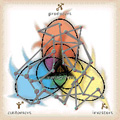"A network economy does not think in supply chain terms or in departmental boxes. It thinks and acts as a web of ideas, people, processes, markets, tools, environments. The parts and the whole grow stronger together. Threads weave together, forming new patterns, new connections, new capabilities. Producers, customers, and investors design, invent, build, market and sell as an ecosystem.
"Co-creation replaces the linear way of thinking and doing where each part gets it 'right' and passes it to the next part to get it 'right' who passes it on and so forth. ValueWeb communities work concurrently, changing 'hats' where appropriate, competing, cooperating ... constantly evolving to bring higher order solutions, people, and opportunities into the web." - Gail Taylor, 1998
 A decade ago I was introduced to a conceptual model of the networked enterprise that is now referred to as the "Value Web" model. Matt Taylor had been actively working with it and introducing it to MG Taylor clients since the 80's, but for the first time, executives and organizational leaders were beginning to embrace it. Today, in a world more fully immersed in the flows and fluidities of the networked economy, value web-like structures are becoming a mainstream means of organizing and getting things done. In the ongoing evolution and learning of how we organize and work together, this way of working is gaining fitness fast.
A decade ago I was introduced to a conceptual model of the networked enterprise that is now referred to as the "Value Web" model. Matt Taylor had been actively working with it and introducing it to MG Taylor clients since the 80's, but for the first time, executives and organizational leaders were beginning to embrace it. Today, in a world more fully immersed in the flows and fluidities of the networked economy, value web-like structures are becoming a mainstream means of organizing and getting things done. In the ongoing evolution and learning of how we organize and work together, this way of working is gaining fitness fast.
In essence, what I am suggesting here is that the idea of a "value web" has, after multiple tries – with each result feeding back into and changing the idea – escaped to a higher order. Whether its with the well-known, well-chronicled Big Ideas such as Open Source, P2P and Web 2.0, or any of a vast array of less publicized but equally compelling experiments, value webs have moved from "model" to "paradigm" – a new way of seeing reality.


